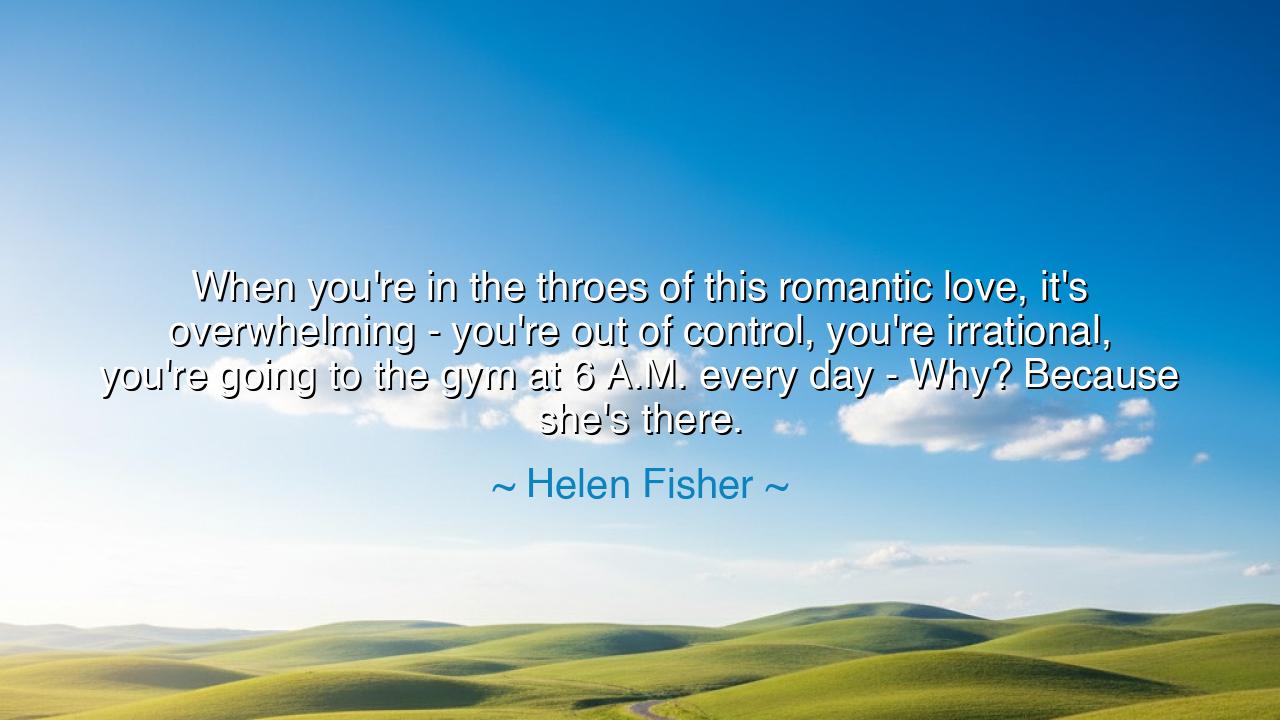
When you're in the throes of this romantic love, it's
When you're in the throes of this romantic love, it's overwhelming - you're out of control, you're irrational, you're going to the gym at 6 A.M. every day - Why? Because she's there.






"When you're in the throes of this romantic love, it's overwhelming - you're out of control, you're irrational, you're going to the gym at 6 A.M. every day - Why? Because she's there." These words by Helen Fisher reveal the profound, almost otherworldly power that romantic love exerts over the human spirit. In the throes of love, one becomes not only consumed by emotion but also compelled to act in ways that defy logic and reason. Fisher’s description reflects the intensity and irrationality of romantic attraction, where the very soul is captured by another, and every thought, every action is influenced by the presence of the beloved. Love, in its deepest form, is a force so powerful it can alter the course of one’s life, compelling a person to sacrifice and transform for the sake of that connection.
The ancients, too, recognized the profound effect of love on the human being. In Greek mythology, the gods themselves were not immune to the influence of love’s overwhelming power. Eros, the god of love, wielded arrows that caused both gods and mortals alike to fall desperately in love, often leading to irrational behavior and compulsive actions. One need only look at the story of Orpheus and Eurydice—Orpheus, in his grief and love for his lost wife, descended into the underworld to reclaim her. His irrational journey, driven by love, speaks to the frenzied nature of desire, a nature that, when unchecked, compels the lover to face even the gods and the most perilous of paths. Orpheus was willing to risk everything, not out of reason, but because his love for Eurydice consumed him entirely. This is the uncontrollable nature of love that Fisher describes.
Consider, too, the story of Helen of Troy, whose beauty sparked a war that led to the destruction of a city. The irrationality of Paris and Helen's love for one another was so powerful that it transcended reason and led to the fall of empires. Their love—like the actions Fisher speaks of—was a force that made the lover act against the better judgment of reason and duty. Paris, in the heat of his passion, made choices that forever altered his destiny, driven by a force that was overwhelming and out of his control. This deep, consuming love is the true force that Fisher alludes to: a love that reshapes lives and destinies through irrational devotion and sacrifice.
Fisher’s imagery of waking at 6 A.M. to go to the gym, driven by the desire to be close to the one you love, speaks to how romantic love can physically transform the body. The lover, in their devotion, does not act out of necessity but out of the desire to please and attract their beloved. This transformation is not simply physical but spiritual, for it is the soul that drives the body to act, to become better, to meet the object of one’s affection. It is no longer just about appearance or health, but about presenting oneself in the best light for the beloved—a reflection of the self’s deepest aspirations.
Think of the story of Antony and Cleopatra, where the love between them altered the course of Rome’s politics and history. Antony, a man of war and politics, was so overcome by his love for Cleopatra that he made decisions that led to his eventual downfall. His actions, often seen as irrational and driven by love, were not based on reason, but on the compelling desire to be with the one he adored. Cleopatra, likewise, exercised great influence over Antony, drawing him into a love that was as much about passion as it was about ambition. Their love affair, marked by great sacrifices and even greater consequences, is an ancient example of the uncontrollable force of love—a force that cannot be tamed by logic or duty.
The lesson that Helen Fisher imparts is that romantic love is not a passive experience—it is a force that compels us to act and transform. It transcends the rational, urging us to step into a world where desire, devotion, and vulnerability guide our actions. In these moments, we are often irrational, acting in ways that defy reason and expecting nothing but the presence of our beloved in return. This devotion is what makes love so transformative, so powerful, and so fundamentally human. Romantic love, when felt deeply, shapes the very essence of who we are, urging us to become more, to give more, to strive for more—simply to win the favor of the one who has captured our heart.
Thus, to those who come after us, I say: embrace the power of love, but understand that its nature is not always one of control. Love can sweep you away, making you act in ways that others may not understand or even find irrational, but in its deep devotion, there is a beauty that connects us to something greater than ourselves. Let love be the force that transforms you, that challenges you to become better, stronger, and more devoted. Just as the ancient lovers risked everything for the sake of passion, so too must we embrace the overwhelming energy of love when it comes, knowing that it is through this irrational devotion that we find our greatest purpose.






AAdministratorAdministrator
Welcome, honored guests. Please leave a comment, we will respond soon